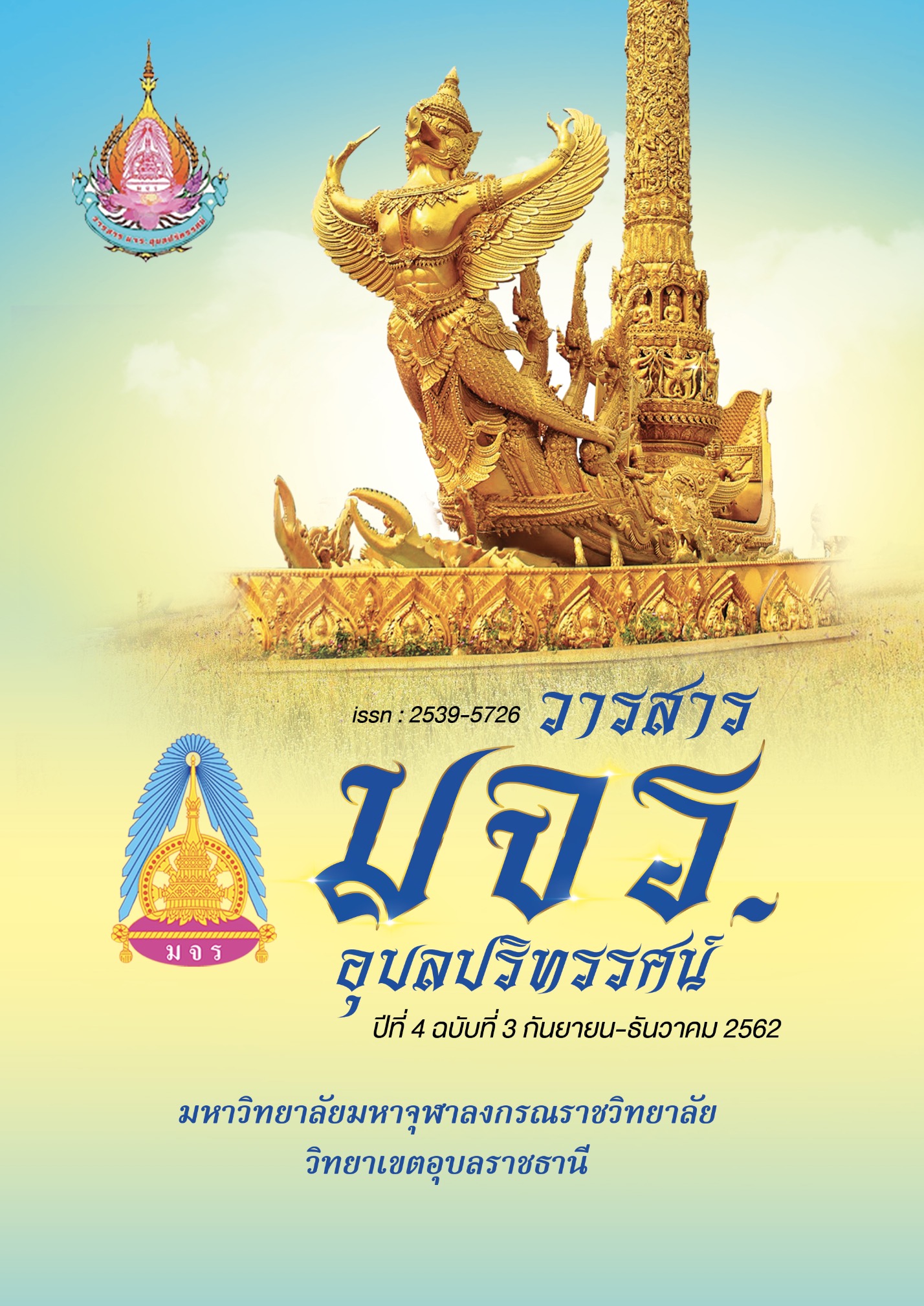การศึกษาเส้นทางและกิจกรรมการท่องเที่ยวเชิงพุทธของพระสงฆ์ สายวัดป่าในภาคตะวันออกเฉียงเหนือ
Main Article Content
บทคัดย่อ
การเดินทางท่องเที่ยววัดป่าตามเส้นทางการท่องเที่ยวเชิงพุทธของพระสงฆ์สายวัดป่าในภาคตะวันออกเฉียงเหนือวัดป่าที่เป็นแหล่งท่องเที่ยวแต่ละแห่งต่างมีเส้นทาง ที่ตั้งและแผนที่สำหรับการท่องเที่ยวมีความสะดวกและความสบายในการเดินทางท่องเที่ยวอย่างชัดเจนส่วนกิจกรรมการท่องเที่ยววัดป่าของพระสงฆ์สายวัดป่าในภาคตะวันออกเฉียงเหนือมีกิจกรรม 2 ส่วน คือ กิจกรรมขั้นพื้นฐานสำหรับพุทธศาสนิกชนและกิจกรรมในวันสำคัญทางพระพุทธศาสนา
ภูมิสถาปัตย์ที่ส่งเสริมการเรียนรู้และการท่องเที่ยวเชิงพุทธของพระสงฆ์สายวัดป่าในภาคตะวันออกเฉียงเหนือ วัดป่าแต่ละแห่งต่างมีภูมิสถาปัตย์สำคัญที่เป็นอัตลักษณ์และเอื้อต่อการส่งเสริมการท่องเที่ยวภายในวัด ซึ่งวัดโพธิ์มีภูมิสถาปัตย์ที่ส่งเสริมการท่องเที่ยวคือ 1) อาคารโพธิสารคุณ 2) ลานธรรม 3) ลานวิปัสสนากรรมฐาน และ 4) ศาลาวัดแผนไทย วัดบูรพาราม มีภูมิสถาปัตย์ที่ส่งเสริมการท่องเที่ยวคือ 1) พระอุโบสถ 2) วิหารจตุรมุข 3) พิพิธภัณฑสถานอตุลเถระ 4) ศาลาปฏิบัติธรรมกัมมัฏฐาน และ 5) กำแพงแก้ว วัดป่าบ้านตาด มีภูมิสถาปัตย์ที่ส่งเสริมการท่องเที่ยวคือ 1) ศาลาการเปรียญ และ 2) พิพิธภัณฑ์อัฐบริขารหลวงตาพระมหาบัว วัดป่าสุทธาวาส มีภูมิสถาปัตย์ที่ส่งเสริมการท่องเที่ยวคือ 1) พิพิธภัณฑ์พระอาจารย์มั่น ภูริทัตเถระ 2) เจดียจันทสารเจติยานุสรณ์ และ 3) พระอุโบสถ ส่วนวัดหนองป่าพง มีภูมิสถาปัตย์ที่ส่งเสริมการท่องเที่ยว คือ 1) โบสถ์วัดหนองป่าพง 2) เจดีย์บรรจุอัฐิหลวงพ่อชา 3) พิพิธภัณฑ์หลวงพ่อชา 4) หอระฆัง 5) กุฏิพยาบาล และ 6) กุฏิหลวงพ่อชา
Article Details
เอกสารอ้างอิง
บุญเลิศ จิตตั้งวัฒนา. (2548). อุตสาหกรรมการท่องเที่ยว.กรุงเทฯ : เพรส แอนด์ ดีไซน์.
ปิยะภรณ์ ไพทยาภรณ์. (2529). ภูมิศาสตร์ไทยเพื่อการท่องเทียว. คณะวิทยาการจัดการ
มหาวิทยาลัยราชภัฏอุดรธานี.
พระโพธิญาณเถร (ชา สุภทฺโท) . (2554) . ศูนย์เผยแผ่มรดกธรรมพระโพธิญาณเถร(ชา สุภทฺโท) .อุบลราชธานี
: อุปลมณี
พระครูภาวนาโพธิคุณ .(2553) . ธรรมทายาทชุดที่ 8. ขอนแก่น : โรงพิมพ์คลังนานาวิทยา.
พระมหาบุญโฮม ปริปุณฺณสีโล.(2553) . คู่มือศาสนพิธี เล่ม 1. พิมพ์ครั้งที่ 2. สุราษฎร์ธานี.
พระราชวรมุนี ( ประยุทธ์ ปยุตฺโต). (2513), การสัมมนาเรื่องพุทธศาสนากับสังคมไทยใน
ปัจจุบัน.กรุงเทพฯ : พุทธสมาคมแห่งประเทศไทยในพระบรมราชูปถัมภ์.
พิมพ์ระวี โรจน์รุ่งสัตย์. (2533).การท่องเที่ยวชุมชน. กรุงเทพฯ : โอเดียนสโตร์.
เลิศพร ภาระสกุล. (2555) .พฤติกรรมนักท่องเที่ยว. กรุงเทพฯ : บริษัท วี.พริ้นท์ (1991) จำกัด.
สมบูรณ์ สุขสาราญ. (2530). การพัฒนาตามแนวพระพุทธศาสนา :กรณีศึกษาพระสงฆ์
นักพัฒนา. กรุงเทพฯ : พิมพ์สวย จำกัด.
สมเด็จพระญาณสังวร (เจริญ สุขวฒฺโน). (2543). รวมธรรมะ.กรุงเทพฯ : บริษัท อมรินทร์พริ้นติ้ง
แอนพับลิชชิ่ง จำกัด.


